高三英语语法与惯用法知识点:习惯上后接to do sth的名词
usedtodosth的用法
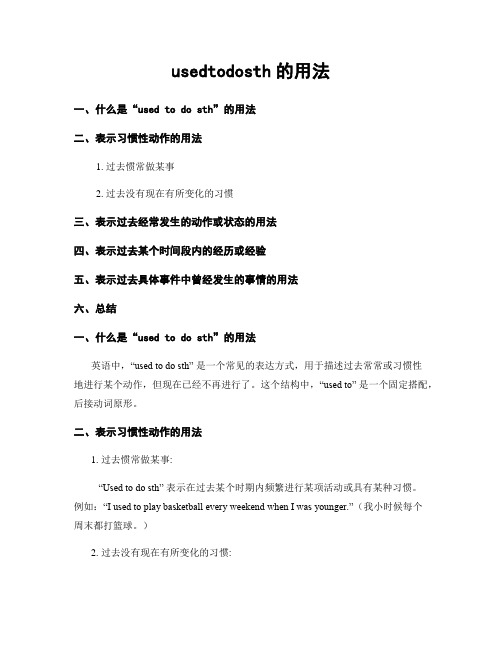
usedtodosth的用法一、什么是“used to do sth”的用法二、表示习惯性动作的用法1. 过去惯常做某事2. 过去没有现在有所变化的习惯三、表示过去经常发生的动作或状态的用法四、表示过去某个时间段内的经历或经验五、表示过去具体事件中曾经发生的事情的用法六、总结一、什么是“used to do sth”的用法英语中,“used to do sth” 是一个常见的表达方式,用于描述过去常常或习惯性地进行某个动作,但现在已经不再进行了。
这个结构中,“used to” 是一个固定搭配,后接动词原形。
二、表示习惯性动作的用法1. 过去惯常做某事:“Used to do sth” 表示在过去某个时期内频繁进行某项活动或具有某种习惯。
例如:“I used to play basketball every weekend when I was younger.”(我小时候每个周末都打篮球。
)2. 过去没有现在有所变化的习惯:“Used to do sth” 还可以描述过去有一个特定的习惯,但现在已经改变了。
例如:“He used to smoke a pack of cigarettes a day, but now he has quit.”(他过去每天吸一包烟,但现在已经戒掉了。
)三、表示过去经常发生的动作或状态的用法“Used to do sth” 也用于描述过去经常发生的动作或某个状态。
这与习惯性动作的用法不同之处在于,并不强调主观上某种习惯性行为,而是描述过去真实且频繁发生的事情。
例如:“They used to live in Paris before moving to London.”(他们以前住在巴黎,后来搬到了伦敦。
)四、表示过去某个时间段内的经历或经验“Used to do sth” 还可以表达一个人在过去某个时间段内所拥有的经验、环境等方面的特征。
例如:“She used to work as a teacher for five years before becoming a writer.”(她从前当了五年老师,然后成了一名作家。
高考英语语法:动词不定式 to do的各种时态语态用法详解

1.概述动词不定式to do是动词的一种非谓语形式,在句中不能单独作谓语。
动词不定式具有动词的性质,它可以有自己的宾语和状语,从而构成动词不定式短语。
它还可以有形式的变化,即一般式、进行式、完成式和完成进行时,主动式和被动式。
同时,动词不定式也具有非动词的性质,相当于一个名词、形容词或副词,可以在句中担任主语、宾语、宾语补足语、表语、定语和状语。
2. 动词不定式的构成动词不定式是由不定式符号to+动词原形构成,在某些情况下to 也可省略。
主动形式被动形式否定式一般式to do/ to be done/ not to do/ not to be done进行式to be doing/ not to be doing完成式to have done/ to have been done/ not to have (been) done完成进行式to have been doing/ not to have been doing2.1不定式的一般式to do/ to be donenot to do/ not to be done不定式的一般式表示的动作通常与主要谓语的动作同时或几乎同时发生,或是在它之后发生。
He appears to be very happy. 他看起来好像很高兴。
(同时发生)To catch the train, we'd better hurry to the station by taxi.为了赶上火车,我们最好赶紧乘出租车去车站。
(赶火车发生在到站之后)2.2不定式的进行式to be doing/ not to be doing不定式的进行式表示正在进行的或与谓语动词同时发生的动作。
It happened to be raining when I got there. 我到达那里的时候,天碰巧在下雨。
I'm glad to be traveling with you. 我很高兴和你一起旅游。
非常实用的动词后加todo和doing做宾语总结

动词后加to do 和doing 的记忆口诀一. 只能用动名词作宾语口诀:考虑建议盼原谅,承认推迟没得想。
避免错过继续练,否定完成停欣赏,禁止想象才冒险,不禁介意弃逃亡。
①consider 考虑 suggest建议/advocate提倡主张 look forward to盼望 forgive原谅/pardon原谅②acknowledge承认/admit 承认 postpone延迟延期/delay延迟/defer拖延 recall回想/fancy幻想爱好③avoid 避免 miss错过 keep保持 practice练习实践④deny否认 complete完成/finish完成 cease 停止/quit放弃停止 appreciate 感激欣赏⑤forbid禁止/prevent阻止 imagine设想 risk冒险⑥can't help不禁 mind 介意 escape逃跑逃避二. 接不定式作宾语的动词【速记口诀】三个希望两答应,两个要求莫拒绝;设法学会做决定,不要假装在选择。
【妙语诠释】三个希望两答应:hope,wish,want,agree,promise两个要求莫拒绝:demand,ask,refuse设法学会做决定:manage,learn,decide不要假装在选择:pretend,choose三. 要求跟不定式的动词口诀希望想学就同意(hope/wish;would like/want;learn;agree)需要决定就选择to do(need;decide(决定);choose(选择))开始喜爱又讨厌(begin/start;like/prefer/love;hate)忘记又记住停止又继续尝试(forget;remember;stop;go on;try)to do; doing意不同命令、警告邀人教(order;warn(警告);ask/tell/invite请/叫/邀请;teach sb. to do)希望想让别人做(wish;want/would like;get(使得,答应)/allow (允许) do)加动名词的动词大集合口诀故事是以一个家长的口吻讲述:我有时很感激欣赏(appreciate)我的孩子,但总是避免(avoid)承认(admit)这一点,请允许(allow)我寻求您的建议(advise),您考虑(consider)后告诉我如何克服这个小缺点。
英语单词惯用法(5)
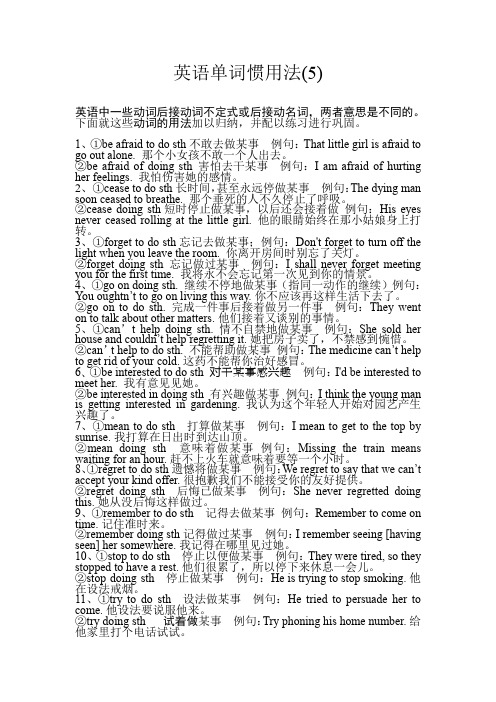
英语单词惯用法(5)英语中一些动词后接动词不定式或后接动名词,两者意思是不同的。
下面就这些动词的用法加以归纳,并配以练习进行巩固。
1、①be afraid to do sth不敢去做某事例句:That little girl is afraid to go out alone. 那个小女孩不敢一个人出去。
②be afraid of doing sth 害怕去干某事例句:I am afraid of hurting her feelings. 我怕伤害她的感情。
2、①cease to do sth长时间,甚至永远停做某事例句:The dying man soon ceased to breathe. 那个垂死的人不久停止了呼吸。
②cease doing sth短时停止做某事,以后还会接着做例句:His eyes never ceased rolling at the little girl. 他的眼睛始终在那小姑娘身上打转。
3、①forget to do sth忘记去做某事;例句:Don't forget to turn off the light when you leave the room. 你离开房间时别忘了关灯。
②forget doing sth 忘记做过某事例句:I shall never forget meeting you for the first time. 我将永不会忘记第一次见到你的情景。
4、①go on doing sth. 继续不停地做某事(指同一动作的继续)例句:You oughtn’t to go on living this way.你不应该再这样生活下去了。
②go on to do sth. 完成一件事后接着做另一件事例句:They went on to talk about other matters.他们接着又谈别的事情。
5、①can’t help doing sth. 情不自禁地做某事例句:She sold her house and couldn’t help regretting it.她把房子卖了,不禁感到惋惜。
习惯上后接to doing sth的名词
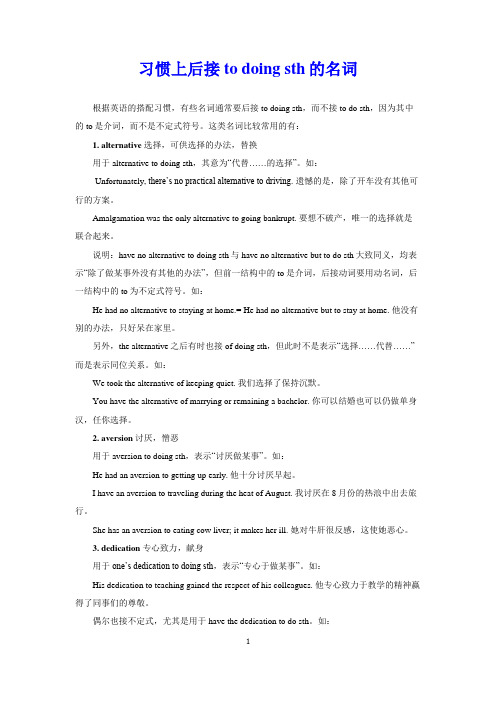
习惯上后接to doing sth的名词根据英语的搭配习惯,有些名词通常要后接to doing sth,而不接to do sth,因为其中的to是介词,而不是不定式符号。
这类名词比较常用的有:1. alternative 选择,可供选择的办法,替换用于alternative to doing sth,其意为“代替……的选择”。
如:Unfortunately, there’s no practical alternative to driving. 遗憾的是,除了开车没有其他可行的方案。
Amalgamation was the only alternative to going bankrupt. 要想不破产,唯一的选择就是联合起来。
说明:have no alternative to doing sth与have no alternative but to do sth大致同义,均表示“除了做某事外没有其他的办法”,但前一结构中的to是介词,后接动词要用动名词,后一结构中的to为不定式符号。
如:He had no alternative to staying at home.= He had no alternative but to stay at home. 他没有别的办法,只好呆在家里。
另外,the alternative之后有时也接of doing sth,但此时不是表示“选择……代替……”而是表示同位关系。
如:We took the alternative of keeping quiet. 我们选择了保持沉默。
You have the alternative of marrying or remaining a bachelor. 你可以结婚也可以仍做单身汉,任你选择。
2. aversion 讨厌,憎恶用于aversion to doing sth,表示“讨厌做某事”。
如:He had an aversion to getting up early. 他十分讨厌早起。
英语语法与惯用法知识点总结.doc

英语语法与惯用法知识点总结【英语语法】一、语法与惯用法知识点:习惯上后接in doing sth的常见名词1.delay 耽搁; 延迟,拖延用于delay in doing sth,表示“在做某事方面的耽搁”。
如:Excuse me for my delay in answering your letter.迟复为歉。
My delay in going abroad is due to my illness.我推迟出国是由于我生病了。
2. delight 快乐,乐趣用于delight in doing sth,表示“做某事的乐趣”“以做某事为乐”。
如:He finds delight in giving to others.他以助人为乐。
I find a perverse delight in listening to traffic.我从听车流噪音中找到一种怪异的乐趣。
注意有用结构take delight in doing sth(喜欢做某事,从做某事中取乐)。
如:She took delight in teasing me.她老爱跟我开玩笑。
Now many people take delight in watching TV.现在许多人都喜欢看电视。
He takes great delight in proving others wrong.他的极大乐趣是证实别人错了。
3. harm 危害用于harm in doing sth,表示“做某事的危害”,尤其用于no harm in doing sth结构。
如:What’s the harm in having a little fun?开点玩笑有什么不好?He may not be able to help but there’s no harm in asking him.他可能帮不了忙,但是求他一下倒也无妨。
The problem may not arise, but there’s no harm in keeping our powder dry.问题不一定会发生,但有备无患并无害处。
英语单词惯用法(38)

英语单词惯用法(38)根据英语的搭配习惯,有些名词通常可以后接to do sth或for (doing) sth。
下面就这些名词的用法加以归纳,并配以练习进行巩固。
1、affection影响;感情;喜爱例句:I have a great affection for New York. 我很喜欢纽约。
He often shows affection to visit this city. 他经常流露出喜爱这座城市。
2、anxiety担心;渴望例句:His anxiety for knowledge is to be praised. 他对知识的渴求应该受到称赞。
In his anxiety not to offend them, he agreed to concessions. 因为怕得罪他们,他同意让步。
3、appeal恳求;呼吁;上诉;吸引力例句:His appeal for forgiveness went unanswered. 他恳请原谅,但没有得到答复。
We made an appeal to the villagers for money to build the bridge. 为建造这座桥,我们呼吁村民捐款。
4、appetite食欲;嗜好;欲望例句:Mary has no appetite for hard work. 玛丽不想干艰苦的工作。
They have the appetite to take a punt on an unproven idea. 他们有兴趣接受一个未经证实的想法。
5、arrangement 安排;约定;商议例句:We have made all the arrangements for the conference. 我们已做好会议的全部筹备工作。
They made an arrangement to meet at the school gate at 3 pm. 他们约定下午三点钟在校门口见面。
动词后跟to do sth
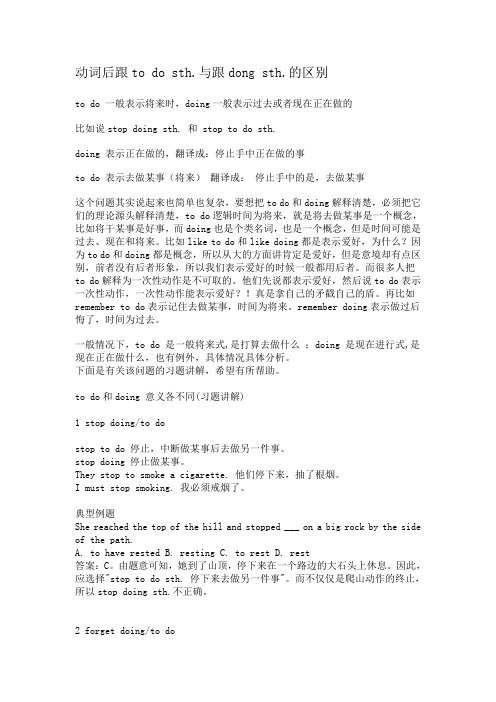
动词后跟to do sth.与跟dong sth.的区别to do 一般表示将来时,doing一般表示过去或者现在正在做的比如说stop doing sth. 和 stop to do sth.doing 表示正在做的,翻译成:停止手中正在做的事to do 表示去做某事(将来)翻译成:停止手中的是,去做某事这个问题其实说起来也简单也复杂,要想把to do和doing解释清楚,必须把它们的理论源头解释清楚,to do逻辑时间为将来,就是将去做某事是一个概念,比如将干某事是好事,而doing也是个类名词,也是一个概念,但是时间可能是过去、现在和将来。
比如like to do和like doing都是表示爱好,为什么?因为to do和doing都是概念,所以从大的方面讲肯定是爱好,但是意境却有点区别,前者没有后者形象,所以我们表示爱好的时候一般都用后者。
而很多人把to do解释为一次性动作是不可取的。
他们先说都表示爱好,然后说to do表示一次性动作,一次性动作能表示爱好?!真是拿自己的矛戳自己的盾。
再比如remember to do表示记住去做某事,时间为将来。
remember doing表示做过后悔了,时间为过去。
一般情况下,to do 是一般将来式,是打算去做什么;doing 是现在进行式,是现在正在做什么,也有例外,具体情况具体分析。
下面是有关该问题的习题讲解,希望有所帮助。
to do和doing 意义各不同(习题讲解)1 stop doing/to dostop to do 停止,中断做某事后去做另一件事。
stop doing 停止做某事。
They stop to smoke a cigarette. 他们停下来,抽了根烟。
I must stop smoking. 我必须戒烟了。
典型例题She reached the top of the hill and stopped ___ on a big rock by the side of the path.A. to have restedB. restingC. to restD. rest答案:C。
英语单词惯用法(50)
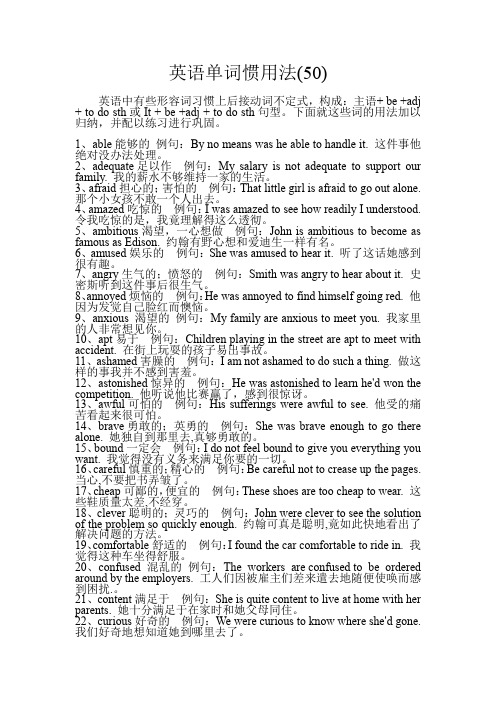
英语单词惯用法(50)英语中有些形容词习惯上后接动词不定式,构成:主语+ be +adj + to do sth或It + be +adj + to do sth句型。
下面就这些词的用法加以归纳,并配以练习进行巩固。
1、able能够的例句:By no means was he able to handle it. 这件事他绝对没办法处理。
2、adequate足以作例句:My salary is not adequate to support our family. 我的薪水不够维持一家的生活。
3、afraid担心的;害怕的例句:That little girl is afraid to go out alone. 那个小女孩不敢一个人出去。
4、amazed吃惊的例句:I was amazed to see how readily I understood. 令我吃惊的是,我竟理解得这么透彻。
5、ambitious渴望,一心想做例句:John is ambitious to become as famous as Edison. 约翰有野心想和爱迪生一样有名。
6、amused娱乐的例句:She was amused to hear it. 听了这话她感到很有趣。
7、angry生气的;愤怒的例句:Smith was angry to hear about it. 史密斯听到这件事后很生气。
8、annoyed烦恼的例句:He was annoyed to find himself going red. 他因为发觉自己脸红而懊恼。
9、anxious 渴望的例句:My family are anxious to meet you. 我家里的人非常想见你。
10、apt易于例句:Children playing in the street are apt to meet with accident. 在街上玩耍的孩子易出事故。
高三英语语法与惯用法知识点:习惯上后接to do sth的名词
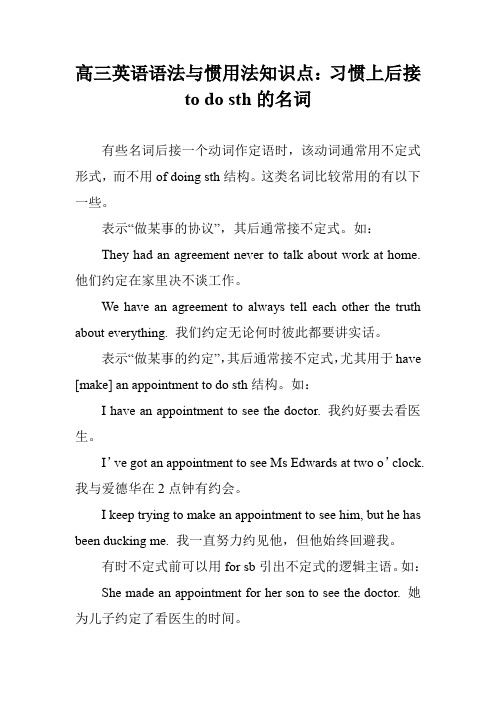
高三英语语法与惯用法知识点:习惯上后接to do sth的名词有些名词后接一个动词作定语时,该动词通常用不定式形式,而不用of doing sth结构。
这类名词比较常用的有以下一些。
表示“做某事的协议”,其后通常接不定式。
如:They had an agreement never to talk about work at home. 他们约定在家里决不谈工作。
We have an agreement to always tell each other the truth about everything. 我们约定无论何时彼此都要讲实话。
表示“做某事的约定”,其后通常接不定式,尤其用于have [make] an appointment to do sth结构。
如:I have an appointment to see the doctor. 我约好要去看医生。
I’ve got an appointment to see Ms Edwards at two o’clock. 我与爱德华在2点钟有约会。
I keep trying to make an appointment to see him, but he has been ducking me. 我一直努力约见他,但他始终回避我。
有时不定式前可以用for sb引出不定式的逻辑主语。
如:She made an appointment for her son to see the doctor. 她为儿子约定了看医生的时间。
表示“某人急于(渴望)做某事”,其后通常接不定式。
如:Her anxiety to go was obvious. 她亟于想去是很明显的。
I nearly fell in my anxiety to get downstairs quickly. 我急匆匆地下楼,差点摔倒。
In my anxiety to succeed, I overworked myself. 由于急于求成,我把自己累坏了。
英语单词惯用法(37)
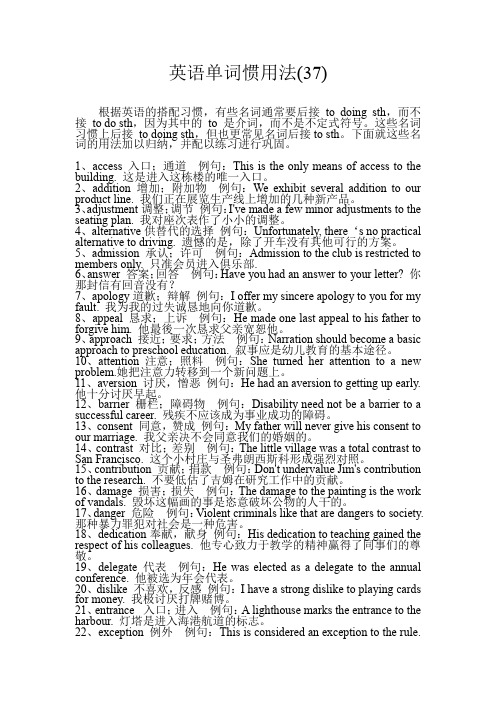
英语单词惯用法(37)根据英语的搭配习惯,有些名词通常要后接to doing sth,而不接to do sth,因为其中的to 是介词,而不是不定式符号。
这些名词习惯上后接to doing sth,但也更常见名词后接to sth。
下面就这些名词的用法加以归纳,并配以练习进行巩固。
1、access 入口;通道例句:This is the only means of access to the building. 这是进入这栋楼的唯一入口。
2、addition 增加;附加物例句:We exhibit several addition to our product line. 我们正在展览生产线上增加的几种新产品。
3、adjustment调整;调节例句:I've made a few minor adjustments to the seating plan. 我对座次表作了小小的调整。
4、alternative供替代的选择例句:Unfortunately, there‘s no practical alternative to driving. 遗憾的是,除了开车没有其他可行的方案。
5、admission 承认;许可例句:Admission to the club is restricted to members only. 只准会员进入俱乐部.6、answer 答案;回答例句:Have you had an answer to your letter? 你那封信有回音没有?7、apology道歉;辩解例句:I offer my sincere apology to you for my fault. 我为我的过失诚恳地向你道歉。
8、appeal 恳求;上诉例句:He made one last appeal to his father to forgive him. 他最後一次恳求父亲宽恕他。
习惯上后接of-doing-sth的名词

习惯上后接of doing sth的名词英语中有些名词通常后接of doing sth,而不接不定式(至少在用于某些结构或表示某些特定意思时不接不定式)。
这类名词比较常见的有:1. act 动作,行为用于the act of doing sth,其字面意思是“做某事的动作”,通常只需译为“做某事”即可(但译文要考虑符合汉语的表达习惯)。
如:For Jane, the act of writing was always difficult. 写东西对简来说一直很难。
The very act of writing out your plan clarifies what you need to do. 把计划书写出来就会使你清楚自己该做什么。
Two politicians who hated each other shook hands as an overt act of showing they are now friendly. 两位敌对的政治家握手言和,显然是要表明他们现在已经友好了。
用于in the act of doing sth,意为“正在做某事时”。
如:He was in the very act of starting. 他正准备动身。
In the act of bending down, he slipped and hurt his back. 他一弯腰滑倒了,跌伤了背。
The thief was apprehended by the police in the act of stealing a car. 窃贼在偷汽车时当场被警察抓住。
2. aim 目的后接of doing sth,意为“做某事的目的”,主要用于with the aim of doing sth这一结构中。
如:She went to London with the aim of finding a job.她去伦敦是为了找工作。
usedto的用法和搭配

used to的用法和搭配
be used for+时间“被用了……时间”,be used to+名词/动名词“习惯于……”,used to“过去常常……”,be used to do“被用做干什么”,be used to doing“现在习惯于做什么”,used to do“过去曾作过什么”。
扩展资料
use的.常见用法有:
1、be used to do被用来做什么。
需要注意:be used to的主语是人时,其意为“习惯于”;be used to的主语不是人而是物时,则为被动语态,意为“被用于”。
如:He has been used to living in the city.他已经在城市里住惯了。
2、used to do仅用于一般过去时,表示过去常常做什么。
(否定式为used not to do或didn't use to do,疑问式把used放句首,或把did放句首)Scarf used to take a walk.Scarf过去常常散步。
3、be used to doing习惯做什么,Scarf is used to taking a walk.Scarf现在习惯于散步。
辨析:
(1)used to do sth.“过去常常做某事”
to后加动词原形,否定句为didn't use to或used not to。
(2)be used to do sth.“被用来做某事”
to后加动词原形。
(3)be used to doing sth“习惯做某事”
to是介词,后加名词,动名词或代词。
中学英语中哪些动词后加todosth和加doingsth

中学英语中哪些动词后加to do sth和加doing sth一、接不定式(而不接动名词)作宾语的24个常用动词afford to do sth。
负担得起做某事 agree to do sth. 同意做某事arrange to do sth。
安排做某事 ask to do sth. 要求做某事beg to do sth。
请求做某事 care to do sth. 想要做某事choose to do sth. 决定做某事 decide to do sth. 决定做某事demand to do sth. 要求做某事 determine to do sth. 决心做某事expect to do sth。
期待做某事 fear to do sth。
害怕做某事help to do sth。
帮助做某事 hope to do sth. 希望做某事learn to do sth. 学习做某事 manage to do sth. 设法做某事offer to do sth. 主动提出做某事 plan to do sth。
计划做某事prepare to do sth。
准备做某事 pretend to do sth. 假装做某事promise to do sth. 答应做某事 refuse to do sth. 拒绝做某事want to do sth. 想要做某事 wish to do sth。
希望做某事注:有些不及物动词后习惯上也接不定式,不接动名词:aim to do sth。
打算做某事 fail to do sth. 未能做某事long to do sth. 渴望做某事 happen to do sth。
碰巧做某事hesitate to do sth。
犹豫做某事 struggle to do sth. 努力做某事二、接不定式作宾补的36个常用动词advise sb。
to do sth。
建议某人做某事 allow sb。
英语单词惯用法(6)

英语单词惯用法(6)下面这些动词和短语习惯上后接“to+动名词”,形成固定的句式。
下面就这些动词和短语的用法加以归纳,并配以练习进行巩固。
1、adapt to doing sth 适应做某事例句:He has adapted to doing that work. 他已经适应做那件工作。
2、admit to doing sth承认做了某事例句:George would never admit to being wrong. 乔治从不认错。
3、amount 意思是做某事,等同于做某事例句:Borrowing money and not returning it amounts to stealing. 借了钱不还就等于偷。
4、apply oneself to doing sth专心致力于做某事例句:They applied themselves to producing bikes. 他们努力生产自行车。
5、apply to doing sth适用于做某事例句:These principles apply to learning maths. 这些原则适用于数学学习。
6、pay attention to doing sth注意做某事例句:Our teachers always pay attention to combining theory with practice. 我们的老师总是注意理论联系实际。
7、contribute to doing sth 促成/有助于做某事例句:Laissez-faire policy result in increase economic activity, but contribute to rising in import. 自由放任政策导致经济活动的增加,但也促进了进口的增长。
8、descend to doing sth 转而提到/堕落到做某事例句:All too soon they will descend to spreading scandal and gossip. 过不了多久他们就会堕落到传播丑闻和谣言的地步。
(完整版)高考英语习惯上后接todosth和ofdoingsth的常见名词盘点
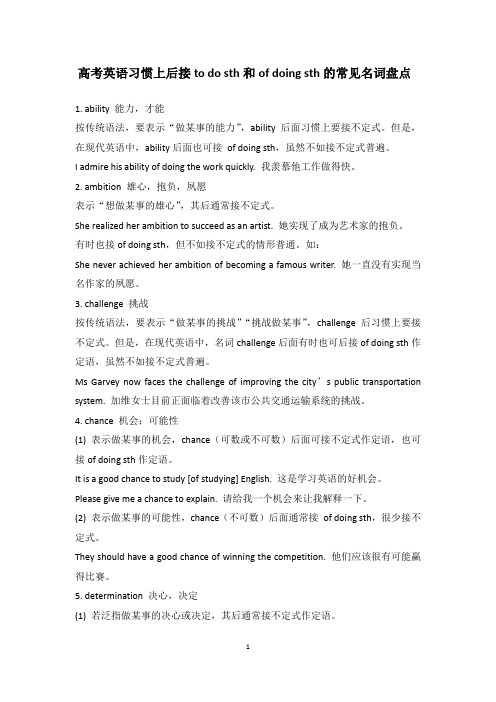
高考英语习惯上后接to do sth和of doing sth的常见名词盘点1. ability 能力,才能按传统语法,要表示“做某事的能力”,ability后面习惯上要接不定式。
但是,在现代英语中,ability后面也可接of doing sth,虽然不如接不定式普遍。
I admire his ability of doing the work quickly. 我羡慕他工作做得快。
2. ambition 雄心,抱负,夙愿表示“想做某事的雄心”,其后通常接不定式。
She realized her ambition to succeed as an artist. 她实现了成为艺术家的抱负。
有时也接of doing sth,但不如接不定式的情形普通。
如:She never achieved her ambition of becoming a famous writer. 她一直没有实现当名作家的夙愿。
3. challenge 挑战按传统语法,要表示“做某事的挑战”“挑战做某事”,challenge后习惯上要接不定式。
但是,在现代英语中,名词challenge后面有时也可后接of doing sth作定语,虽然不如接不定式普遍。
Ms Garvey now faces the challenge of improving the city’s public transportation system. 加维女士目前正面临着改善该市公共交通运输系统的挑战。
4. chance 机会;可能性(1) 表示做某事的机会,chance(可数或不可数)后面可接不定式作定语,也可接of doing sth作定语。
It is a good chance to study [of studying] English. 这是学习英语的好机会。
Please give me a chance to explain. 请给我一个机会来让我解释一下。
常后接todosth和for[of]doingsth的名词
![常后接todosth和for[of]doingsth的名词](https://img.taocdn.com/s3/m/d23faec05122aaea998fcc22bcd126fff7055dfa.png)
常后接to do sth和for [of] doing sth的名词1. capacity 能力,才能表示做某事的能力,capacity后可接 to do sth, for doing sth, of doing sth。
如:He has a great capacity for enjoying himself. 他很会想办法自得其乐。
Her capacity to remember facts is remarkable. 她的记忆力很惊人。
The boy shows a great capacity to learn [of learning, for learning] languages. 这孩子显露出学习语言的卓越能力。
2. means 方式,方法,手段;财力,金钱(1) 表示做某事的财力,其后通常接不定式,且尤其见于have the means to do sth这一结构。
如:He doesn’t have the means to support a wife and child. 他没有钱养活妻子和孩子。
Small businesses don’t have the means to develop a sophisticated Internet presence. 小企业通常没有财力投资建设复杂的因特网平台。
(2) 表示做某事的方法,means后通常接of doing sth。
如:We had no means of warning them. 我们没有办法警告他们。
There is no means of finding out what happened. 无法弄清发生了什么事情。
Can you devise a means of overcoming the problem? 你能想出法子来解决这个难题吗?有时也可后接不定式,但不如后接of doing sth常见。
如:My English teacher provided me with the means to enjoy reading poetry. 我的英语老师告诉了我欣赏诗歌的方法。
高三英语语法与惯用法知识点:后接to do sth的常见名词
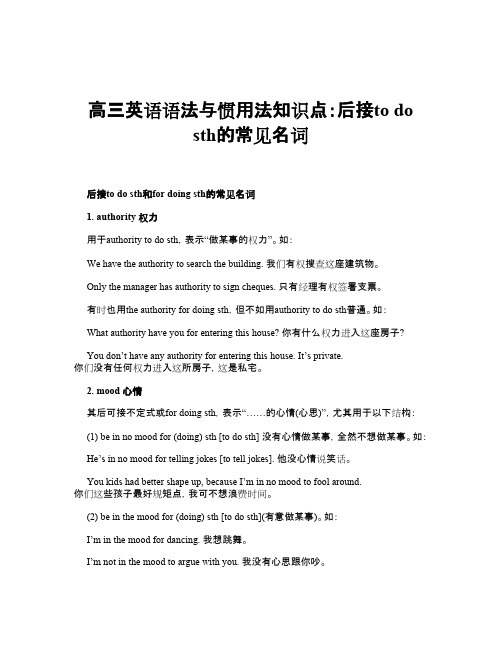
高三英语语法与惯用法知识点:后接to dosth的常见名词 后接to do sth和for doing sth的常见名词 1. authority 权力 用于authority to do sth,表示“做某事的权力”。
如: We have the authority to search the building. 我们有权搜查这座建筑物。
Only the manager has authority to sign cheques. 只有经理有权签署支票。
有时也用the authority for doing sth,但不如用authority to do sth普通。
如: What authority have you for entering this house? 你有什么权力进入这座房子? You don’t have any authority for entering this house. It’s private.你们没有任何权力进入这所房子,这是私宅。
2. mood 心情 其后可接不定式或for doing sth,表示“……的心情(心思)”,尤其用于以下结构: (1) be in no mood for (doing) sth [to do sth] 没有心情做某事,全然不想做某事。
如: He’s in no mood for telling jokes [to tell jokes]. 他没心情说笑话。
You kids had better shape up, because I’m in no mood to fool around.你们这些孩子最好规矩点,我可不想浪费时间。
(2) be in the mood for (doing) sth [to do sth](有意做某事)。
如: I’m in the mood for dancing. 我想跳舞。
I’m not in the mood to argue with you. 我没有心思跟你吵。
高三英语语法与惯用法知识点:do sb + n.结构
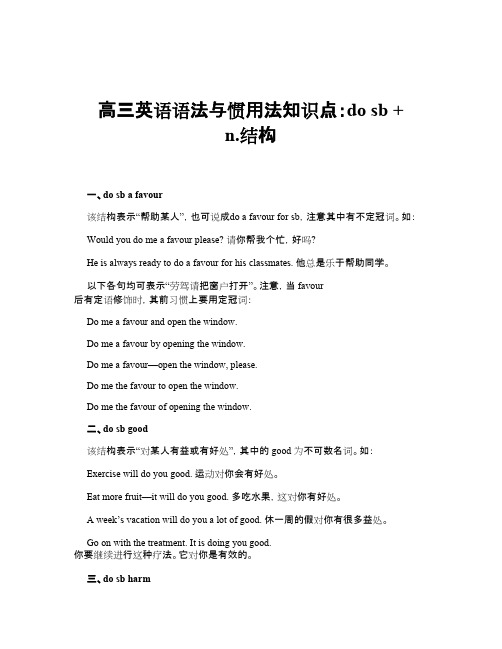
高三英语语法与惯用法知识点:do sb +n.结构 一、do sb a favour 该结构表示“帮助某人”,也可说成do a favour for sb,注意其中有不定冠词。
如: Would you do me a favour please? 请你帮我个忙,好吗? He is always ready to do a favour for his classmates. 他总是乐于帮助同学。
以下各句均可表示“劳驾请把窗户打开”。
注意,当 favour后有定语修饰时,其前习惯上要用定冠词: Do me a favour and open the window. Do me a favour by opening the window. Do me a favour—open the window, please. Do me the favour to open the window. Do me the favour of opening the window. 二、do sb good 该结构表示“对某人有益或有好处”,其中的 good 为不可数名词。
如: Exercise will do you good. 运动对你会有好处。
Eat more fruit—it will do you good. 多吃水果,这对你有好处。
A week’s vacation will do you a lot of good. 休一周的假对你有很多益处。
Go on with the treatment. It is doing you good.你要继续进行这种疗法。
它对你是有效的。
三、do sb harm 该结构表示“对某人有害”,其中的 harm 为不可数名词。
如: Smoking does harm to your health. 吸烟对你的身体有害。
A few late nights never did anyone any harm. 熬几个晚上的夜对人绝无害处。
【高中英语】名词与to do不定式如何搭配
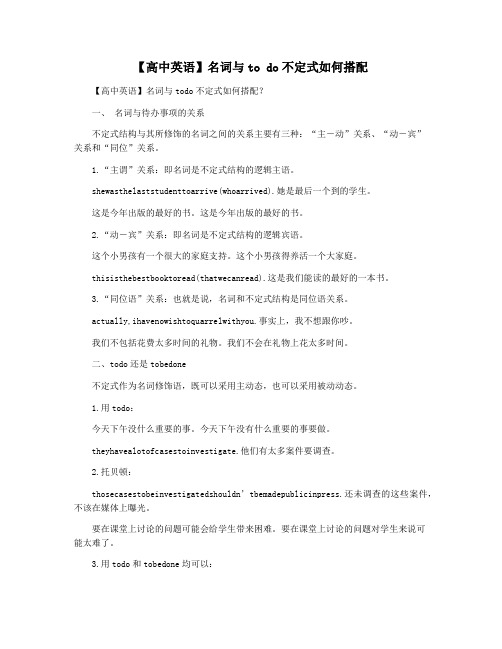
【高中英语】名词与to do不定式如何搭配【高中英语】名词与todo不定式如何搭配?一、名词与待办事项的关系不定式结构与其所修饰的名词之间的关系主要有三种:“主―动”关系、“动―宾”关系和“同位”关系。
1.“主谓”关系:即名词是不定式结构的逻辑主语。
shewasthelaststudenttoarrive(whoarrived).她是最后一个到的学生。
这是今年出版的最好的书。
这是今年出版的最好的书。
2.“动―宾”关系:即名词是不定式结构的逻辑宾语。
这个小男孩有一个很大的家庭支持。
这个小男孩得养活一个大家庭。
thisisthebestbooktoread(thatwecanread).这是我们能读的最好的一本书。
3.“同位语”关系:也就是说,名词和不定式结构是同位语关系。
actually,ihavenowishtoquarrelwithyou.事实上,我不想跟你吵。
我们不包括花费太多时间的礼物。
我们不会在礼物上花太多时间。
二、todo还是tobedone不定式作为名词修饰语,既可以采用主动态,也可以采用被动动态。
1.用todo:今天下午没什么重要的事。
今天下午没有什么重要的事要做。
theyhavealotofcasestoinvestigate.他们有太多案件要调查。
2.托贝顿:thosecasestobeinvestigatedshouldn’tbemadepublicinpress.还未调查的这些案件,不该在媒体上曝光。
要在课堂上讨论的问题可能会给学生带来困难。
要在课堂上讨论的问题对学生来说可能太难了。
3.用todo和tobedone均可以:请填写《邀请/被邀请的顾客名单》。
请给我一份要邀请的客人名单。
thereisnotimetolose/tobelost.没时间可以浪费了。
不定式与名词的搭配是指不定式作为名词的后修饰语。
句子的用法应该根据“主谓”、“动宾”和“同位语”之间的关系进行详细分析。
- 1、下载文档前请自行甄别文档内容的完整性,平台不提供额外的编辑、内容补充、找答案等附加服务。
- 2、"仅部分预览"的文档,不可在线预览部分如存在完整性等问题,可反馈申请退款(可完整预览的文档不适用该条件!)。
- 3、如文档侵犯您的权益,请联系客服反馈,我们会尽快为您处理(人工客服工作时间:9:00-18:30)。
高三英语语法与惯用法知识点:习惯上后接t
o do sth的名词
有些名词后接一个动词作定语时,该动词通常用不定式形式,而不用of doing
sth结构。
这类名词比较常用的有以下一些。
1. agreement 协议
表示“做某事的协议”,其后通常接不定式。
如:
They had an agreement never to talk about work at home.
他们约定在家里决不谈工作。
We have an agreement to always tell each other the truth about everything.
我们约定无论何时彼此都要讲实话。
2. appointment 约定
表示“做某事的约定”,其后通常接不定式,尤其用于have [make] an appointment to do sth结构。
如:
I have an appointment to see the doctor. 我约好要去看医生。
I’ve got an appointment to see Ms Edwards at two o’clock.
我与爱德华在2点钟有约会。
I keep trying to make an appointment to see him, but he has been ducking me.
我一直努力约见他,但他始终回避我。
有时不定式前可以用for sb引出不定式的逻辑主语。
如:
She made an appointment for her son to see the doctor.
她为儿子约定了看医生的时间。
3. anxiety 渴望;焦急,着急
表示“某人急于(渴望)做某事”,其后通常接不定式。
如:
Her anxiety to go was obvious. 她亟于想去是很明显的。
I nearly fell in my anxiety to get downstairs quickly. 我急匆匆地下楼,差点摔倒。
In my anxiety to succeed, I overworked myself. 由于急于求成,我把自己累坏了。
有时可将其中的不定式改为for sth,但不宜改为for doing sth。
如:
他渴望成功之心使他努力工作。
误:His anxiety for succeeding led him to work hard.
正:His anxiety to succeed led him to work hard.
正:His anxiety for success led him to work hard.
4. aspiration 渴望,抱负,志气
表示“做某事的志向或渴望”,其后通常接不定式。
如:
She was filled with the aspiration to succeed in life. 她渴望有所成就。
He has an aspiration to become a scholar. 他怀有要成为学者的抱负。
He has never had any aspiration to earn a lot of money. 他从未企图赚很多钱。
5. attempt 尝试,试图
表示“做某事的尝试(企图)”,其后通常接不定式。
如:
The storm discouraged his attempt to sail. 暴风雨打消了他扬帆航行的念头。
She sent a sample of her work in an attempt to get a job.
她寄去一份作品样本希望获得聘用。
I am afraid my attempt to make a cake was not very successful.
恐怕我这蛋糕做得不怎么样。
其中的不定式有时可换成at doing sth。
如:
All their attempts to reach [at reaching] the summit failed.
他们攀登顶峰的所有尝试都失败了。
6. competence 能力,胜任
表示“做某事的能力”,其后通常接不定式。
如:
I doubt his competence to do the work. 我怀疑他是否有能力做那项工作。
He gradually developed the competence to deal with the more difficult cases. 他逐渐培养出了处理更困难问题的能力。
